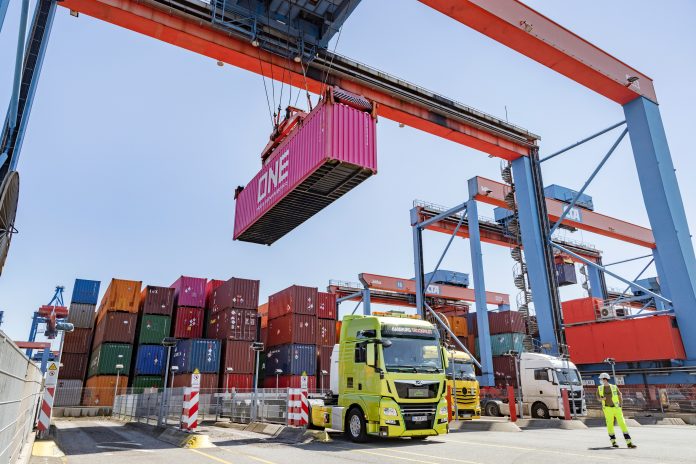Hamburger Hafen und Logistik AG (HHLA) and Munich-based truck manufacturer MAN Truck & Bus are working on self-driving trucks project for use in hub-to-hub container traffic.
In late May, practice tests were successfully carried out for the first time with a self-driving truck in regular traffic at HHLA Container Terminal Altenwerder (CTA).
The development of self-driving trucks is part of the “Hamburg TruckPilot” research project which aims to introduce automation solutions for road transport. The project, according to a statement, focuses on customer-specific deployment and the feasibility of integrating self-driving trucks in the container handling process at the CTA, which serves as a highly automated testing ground.
Following preparatory and test phases, practical test drives took place at the end of May in which the prototype truck, equipped with electronic automation systems, drove in the course of regular logistical operations.
As part of the two-day practice tests, the German logistics company, Spedition Weets brought 40-foot containers from Weets Logistic Center in Soltau to Hamburg on behalf of VW Group Logistics.
A wide range of data for automated driving was already collected along the A7 motorway on the route to Hamburg, according to an announcement.

The Weets driver moved to the passenger seat at the check-in gate at the entrance to Terminal Altenwerder to make way for a trained MAN safety driver, who monitored the autonomous driving functions and would take over the wheel if needed.
The prototype truck accelerated on its own, approached the storage block at 25 km/h, and manoeuvred the container chassis backwards into the assigned lane. The automated return trip to the check gate took place following handling of the container., while the safety driver did not need to intervene a single time.
Sebastian Völl, project manager for automated driving at MAN Truck & Bus, highlighted the law that was recently passed by the German parliament and the Federal Council which makes deployment of autonomous driving systems possible in principle in Germany when they take place in defined areas of operation such as on routes between logistics hubs, and when they are monitored by technical supervisors.
Further potential advantages are found in the increase in efficiency that results from anticipatory, automated driving, according to HHLA, which added, “The concept significantly reduces fuel consumption and can positively influence the general flow of traffic.”
The Hamburg TruckPilot project is part of the strategic mobility partnership between the Free and Hanseatic City of Hamburg and the Volkswagen Group. The project partners will present detailed results of the project at the ITS World Congress in Hamburg in October 2021.
 Hotline: 0944 284 082
Hotline: 0944 284 082
 Email:
Email: 


 VN
VN